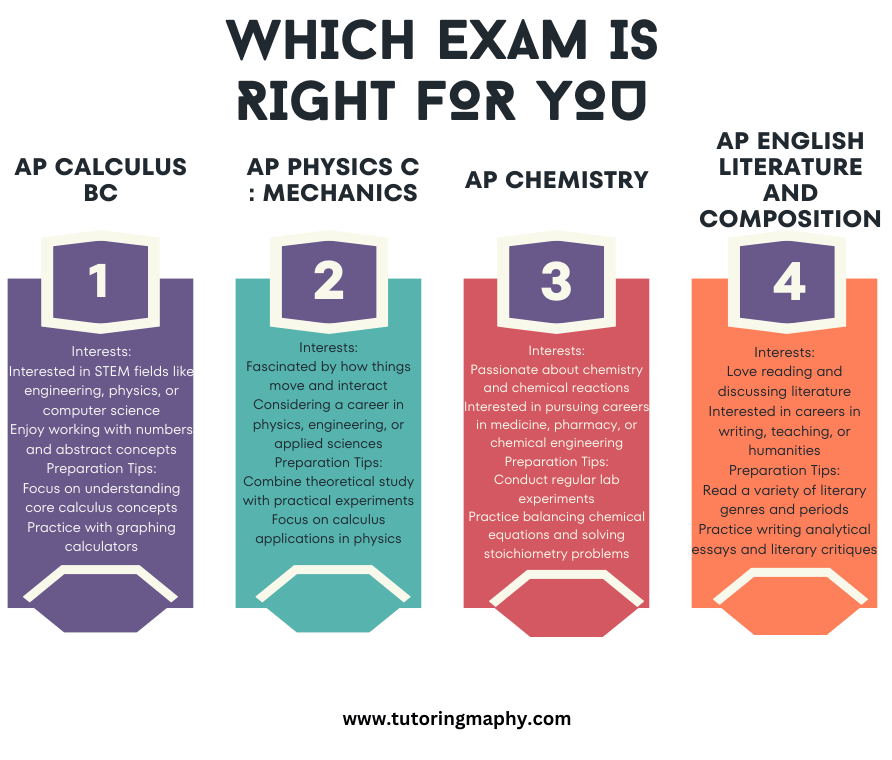Introduction
In Part 1 of our series, “AP Exams That Push Limits : A Guide to the Most Difficult AP Exams Part 1” we explore the most challenging AP exams: AP Calculus BC, AP Physics C: Mechanics, AP Chemistry, and AP English Literature. You’ll learn why these exams are tough, what they cover, and get valuable tips to help you succeed.
Understanding the Toughest AP Exams
AP exams, where high school students step up to the plate to take on college-level coursework and prove their academic capabilities. AP exams are no walk in the park; they require dedication, hard work, and a deep understanding of the subject matter. But among these already challenging tests, some stand out as particularly tough, pushing students to their limits and testing their knowledge and skills in ways that few other high school courses can.
In this two-part series, we will inquire into the AP exams that are widely regarded as the most difficult. We’ll explore why these exams are so challenging, what they cover, and how you can prepare to conquer them. Whether you’re a student looking to push yourself or a parent seeking to understand the rigors your child is facing, this guide will provide valuable insights and tips.
Why Take Difficult AP Exams?
At this point, you might be wondering, “Why would anyone voluntarily subject themselves to the toughest AP exams?” It’s a fair question, especially considering the effort and stress involved. However, there are several compelling reasons why students choose to tackle these challenging tests.
1. College Credit and Advanced Placement: One of the most tangible benefits of taking AP exams is the potential to earn college credit or advanced placement in college courses. Scoring well on AP exams can save students time and money by allowing them to skip introductory courses and move directly into higher-level classes. This can be particularly advantageous for students planning to attend colleges that accept AP credits. If you are interested to know more about credits, checkout How are AP and College credits related?
2. Academic Rigor and Challenge: For many students, the allure of the toughest AP exams lies in the challenge itself. These students thrive on pushing their limits and testing their capabilities. Tackling a difficult AP exam can be a way to prove to themselves, their teachers, and college admissions committees that they are capable of handling demanding coursework.
3. Strengthening College Applications: College admissions officers look for students who have challenged themselves academically. Taking and succeeding in difficult AP exams demonstrates a student’s commitment to their education and their ability to excel in rigorous academic environments. This can be a significant factor in the competitive college admissions process.
4. Deepening Knowledge and Skills: AP exams, especially the toughest ones, require students to develop a deep understanding of the subject matter and hone their critical thinking, problem-solving, and analytical skills. These are valuable skills that will serve students well in college and beyond, regardless of their chosen field of study.
5. Personal Growth and Confidence: The process of preparing for and taking difficult AP exams can foster personal growth and boost confidence. Overcoming the challenges these exams present can give students a sense of accomplishment and the confidence to tackle future academic and professional challenges.
Taking on the toughest AP exams is not for everyone, but for those who choose to rise to the challenge, the rewards can be significant. In the following sections, we’ll explore specific AP exams that are known for their difficulty, providing insights and strategies to help you succeed.

AP Calculus BC: Overview
AP Calculus BC is one of the most challenging Advanced Placement exams offered by the College Board. It covers a wide range of topics in calculus, extending beyond the scope of AP Calculus AB. While AP Calculus AB focuses primarily on differential and integral calculus, AP Calculus BC probes deeper into these areas and includes additional concepts such as sequences, series, and parametric equations. This course is designed for students who have a strong foundation in mathematics and are ready to tackle more advanced material.
The exam itself consists of two sections: multiple-choice and free-response. The multiple-choice section is divided into two parts: one that allows the use of a graphing calculator and one that does not. Similarly, the free-response section is split into calculator and non-calculator parts. This structure tests not only a student’s understanding of calculus concepts but also their ability to apply these concepts in various contexts, both with and without technology.
Key Topics and Concepts in AP Calculus BC
AP Calculus BC covers all the material included in AP Calculus AB, plus several additional topics. Here are the key areas of focus:
1. Limits and Continuity
- Understanding the concept of a limit
- Determining limits using algebraic manipulation
- Analyzing continuity at a point and over an interval
2. Derivatives
- Defining the derivative and interpreting it as a rate of change
- Differentiation rules (product rule, quotient rule, chain rule)
- Applications of derivatives (motion, optimization, related rates)
3. Integrals
- Understanding antiderivatives and definite integrals
- The Fundamental Theorem of Calculus
- Techniques of integration (substitution, integration by parts)
4. Applications of Integrals
- Calculating areas under curves and between curves
- Determining volumes of solids of revolution
- Solving problems involving accumulation functions
5. Sequences and Series
- Defining and analyzing sequences
- Working with series, including convergence and divergence
- Power series and Taylor series
6. Parametric, Polar, and Vector Functions
- Graphing and analyzing parametric equations
- Converting between polar and Cartesian coordinates
- Understanding and working with vector-valued functions
Want to know more about this topic? Check this out
| Exam | 5 | 4 | 3 | 2 | 1 | +3 |
|---|---|---|---|---|---|---|
| AP Calculus AB | 22.4% | 16.2% | 19.4% | 21.7% | 20.3% | 58% |
| AP Calculus BC | 43.5% | 15.9% | 19% | 15.2% | 6.3% | 78.5% |
| AP Computer Science A | 26.8% | 22.4% | 18.8% | 9.5% | 22.5% | 68% |
| AP Computer Science Principles | 11.5% | 20.6% | 31.1% | 20.5% | 16.4% | 63.1% |
| AP Statistics | 15.1% | 22.2% | 22.7% | 16.2% | 23.8% | 60% |
The score distribution table shows the percentages of 1s, 2s, 3s, 4s, and 5s for Math and Computer science
AP Physics C – Mechanics: Overview
AP Physics C: Mechanics is a rigorous, college-level course designed for students who have a strong interest in physics and are comfortable with calculus. This course dives deep into the fundamental principles of mechanics, focusing on the motion and interaction of objects. Unlike AP Physics 1, which uses algebra-based methods, AP Physics C: Mechanics relies heavily on calculus, making it more challenging and mathematically intensive.
The AP Physics C: Mechanics exam is split into two sections: multiple-choice and free-response. Both sections require a deep understanding of physical principles and the ability to apply calculus to solve complex problems. Success in this course not only prepares students for advanced studies in physics and engineering but also hones problem-solving skills applicable to a wide range of disciplines.
Core Topics in AP Physics C: Mechanics
AP Physics C: Mechanics covers several key topics, each fundamental to understanding the physical world:
1. Kinematics
- Describing motion in one and two dimensions
- Analyzing velocity and acceleration
- Understanding motion graphs
2. Newton’s Laws of Motion
- First, second, and third laws of motion
- Applying Newton’s laws to various systems
- Concepts of force, mass, and acceleration
3. Work, Energy, and Power
- Work done by forces
- Kinetic and potential energy
- Conservation of energy
- Power and its calculation
4. Systems of Particles and Linear Momentum
- Center of mass and motion of a system of particles
- Impulse and momentum
- Conservation of momentum and collisions
5. Circular Motion and Rotation
- Uniform circular motion
- Rotational kinematics and dynamics
- Torque, rotational inertia, and angular momentum
6. Oscillations and Gravitation
- Simple harmonic motion
- Pendulums and springs
- Newton’s law of gravitation
- Orbits of planets and satellites
To know more about this topic, you can check out AP Physics C Mechanics: Key Points You Need to Know
AP Chemistry
AP Chemistry is a college-level course designed to provide students with a rigorous and comprehensive understanding of chemical principles and their applications. The course is intended for students who have already completed a high school chemistry course and are looking to go further. AP Chemistry covers a wide range of topics, from atomic structure to thermodynamics, and it emphasizes both theoretical concepts and laboratory skills.
The AP Chemistry exam consists of two sections: multiple-choice and free-response. The multiple-choice section tests students’ understanding of chemical concepts and their ability to solve problems quickly and accurately. The free-response section requires students to explain their reasoning, design experiments, and interpret data. Success in AP Chemistry not only demonstrates a high level of proficiency in chemistry but also earns students college credit and advanced placement in university courses.
Essential Topics in AP Chemistry
AP Chemistry covers several key areas, each essential for a thorough understanding of the subject:
1. Atomic Structure and Properties
- Atomic theory and structure
- Electron configuration
- Periodic trends and properties
2. Molecular and Ionic Compound Structure and Properties
- Bonding theories (ionic, covalent, metallic)
- Molecular geometry and VSEPR theory
- Polarity and intermolecular forces
3. Intermolecular Forces and Properties
- Types of intermolecular forces (dipole-dipole, hydrogen bonding, London dispersion)
- Properties of liquids and solids
- Solutions and solubility
4. Chemical Reactions
- Types of chemical reactions (synthesis, decomposition, single replacement, double replacement, combustion)
- Balancing chemical equations
- Stoichiometry and reaction yields
5. Kinetics
- Reaction rates and rate laws
- Factors affecting reaction rates
- Reaction mechanisms and catalysts
6. Thermodynamics
- Energy changes in chemical reactions
- First and second laws of thermodynamics
- Enthalpy, entropy, and Gibbs free energy
7. Equilibrium
- Dynamic nature of equilibrium
- Le Chatelier’s principle
- Calculating equilibrium constants
8. Acids and Bases
- Acid-base theories (Arrhenius, Bronsted-Lowry, Lewis)
- pH and pOH calculations
- Acid-base titrations and buffers
9. Applications of Thermodynamics
- Electrochemistry and redox reactions
- Galvanic and electrolytic cells
- Standard reduction potentials
| Exam | 5 | 4 | 3 | 2 | 1 | 3+ |
|---|---|---|---|---|---|---|
| AP Biology | 14.3% | 23% | 27.2% | 23.6% | 12% | 64.4% |
| AP Chemistry | 16% | 27.1% | 32% | 16.9% | 8% | 75.1% |
| AP Environmental Science | 8.3% | 28.4% | 17% | 26.4% | 19.9% | 53.7% |
| AP Physics 1 | 8.8% | 18.3% | 18.5% | 28% | 26.4% | 45.6% |
| AP Physics 2 | 16.5% | 18.5% | 34.9% | 23.8% | 6.4% | 69.8% |
| AP Physics C: Electricity and Magnetism | 33.6% | 23.5% | 13.1% | 17.9% | 11.9% | 70.2% |
| AP Physics C: Mechanics | 26.4% | 26.3% | 20.7% | 14% | 12.5% | 73.5% |
The score distribution table shows the percentages of 1s, 2s, 3s, 4s, and 5s for Sciences
To know more about 2023 score distribution for various AP Exams, check this out
AP English Literature and Composition
AP English Literature and Composition is a college-level course that challenges students to analyze and interpret literary texts from various genres, periods, and cultures. The course emphasizes critical reading, analytical writing, and effective communication. Students engage with complex works of literature, exploring themes, character development, narrative techniques, and more. The goal is to develop a deep understanding of the texts and to articulate that understanding through well-crafted essays and discussions.
The AP English Literature and Composition exam tests students’ abilities to read closely, think critically, and write analytically. It consists of two main sections: multiple-choice questions that assess students’ reading comprehension and interpretation skills, and free-response questions that require in-depth analysis of prose and poetry.
Key Components of AP English Literature
1. Close Reading and Analysis
Focus on detailed and careful reading of texts.
Analyze literary devices, themes, and stylistic elements.
Understand how language and structure contribute to meaning.
2. Literary Genres and Periods
Study a wide range of literary genres, including poetry, drama, and fiction.
Explore works from different historical periods and cultural contexts.
Recognize the characteristics and conventions of various literary forms.
3. Major Literary Themes
Examine recurring themes such as love, power, identity, and conflict.
Analyze how different authors approach similar themes.
Consider the historical and social contexts that shape these themes.
4. Writing and Composition
Develop skills in writing clear, coherent, and persuasive essays.
Practice different types of writing, including literary analysis, argumentative essays, and personal reflections.
Focus on thesis development, organization, textual evidence, and style.
5. Discussion and Interpretation
Engage in discussions to share interpretations and insights.
Learn to support arguments with textual evidence.
Appreciate diverse perspectives and critical approaches.
| Exam | 5 | 4 | 3 | 2 | 1 | 3+ |
|---|---|---|---|---|---|---|
| AP English Language & Composition | 10.3% | 19.7% | 26.1% | 29.5% | 14.4% | 56.1% |
| AP English Literature & Composition | 14.9% | 27.8% | 34.5% | 14.4% | 8.4% | 77.2% |
The score distribution table shows the percentages of 1s, 2s, 3s, 4s, and 5s for AP English
Do you know how many AP exams are in total? This blog has all the details the list of all AP exams.
Conclusion
As we wrap up the first part of our guide to the most difficult AP exams, it’s clear that these tests require a deep commitment to learning and a robust strategy for preparation. AP Calculus BC, AP Physics C: Mechanics, and AP Chemistry stand out not just for their complexity, but for the way they push students to develop advanced problem-solving skills, conceptual understanding, and analytical thinking.
In A Guide to the Most Difficult AP Exams Part 2, we’ll continue our journey by exploring more demanding AP exams, including AP Biology, AP United States History, AP World History and AP Statistics.
Successfully navigating these courses and their corresponding exams is no small feat. It demands consistent effort, strategic studying, and a willingness to seek help and resources when necessary. By understanding the core topics, employing effective study strategies, and addressing common challenges head-on, students can demystify these tough subjects and achieve their academic goals.
Remember, taking on these challenging AP exams is not just about earning college credit or boosting your GPA. It’s also about pushing your intellectual boundaries, discovering your academic passions, and preparing yourself for the rigorous demands of college and beyond. In the next part of our series, we will explore more of the most difficult AP exams, providing you with the insights and strategies needed to tackle them with confidence. Stay tuned and keep striving for excellence!
Interested to know how long are these AP exams? Read AP Exam Length: How long are AP exams?
Frequently Asked Questions (FAQs)
1. What is the most difficult AP class?
Answer: The difficulty of an AP class can vary depending on the student’s strengths and interests. However, some of the most challenging AP classes often cited by students include AP Calculus BC, AP Chemistry, AP Physics C (Mechanics and Electricity & Magnetism), and AP Biology. These courses are known for their rigorous content, extensive material, and demanding exams.
2. How difficult is AP Chemistry?
Answer: AP Chemistry is considered one of the more challenging AP courses due to its comprehensive coverage of chemical principles and the need for both strong conceptual understanding and practical laboratory skills. The course involves complex topics such as stoichiometry, thermodynamics, kinetics, and equilibrium, requiring students to engage in detailed problem-solving and critical thinking. Success in AP Chemistry often depends on consistent study habits, effective time management, and a solid grasp of foundational chemistry concepts.
4. How difficult is AP Physics?
Answer: The difficulty of AP Physics can vary depending on the specific course. AP Physics 1 and AP Physics 2 are algebra-based and cover fundamental physics concepts, making them accessible to students with a good grasp of algebra and trigonometry. However, AP Physics C (Mechanics and Electricity & Magnetism) is calculus-based and significantly more challenging. It requires a solid understanding of both physics principles and calculus, making it one of the toughest AP courses. Success in AP Physics C demands strong mathematical skills, problem-solving abilities, and a thorough understanding of physical laws.
Confused about which AP Physics course is right for you? Read Which AP Physics should you take – AP Physics 1 or AP Physics C?
6. How difficult is AP Calculus?
Answer: The difficulty of AP Calculus depends on whether you are taking AP Calculus AB or AP Calculus BC. AP Calculus AB covers fundamental calculus concepts such as limits, derivatives, and integrals and is considered challenging but manageable for students with a strong background in pre-calculus. AP Calculus BC includes all the topics in AB plus additional content such as parametric equations, polar coordinates, and series, making it more challenging and fast-paced. Both courses require strong mathematical skills, logical reasoning, and the ability to apply calculus concepts to solve complex problems. Students who are well-prepared in pre-calculus and willing to dedicate time to practice can succeed in AP Calculus.



